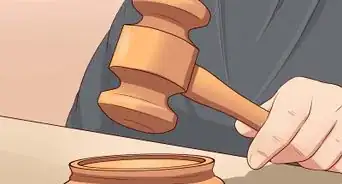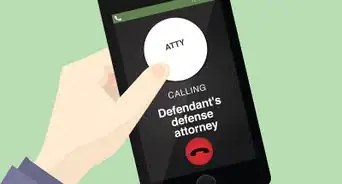This article was written by Jennifer Mueller, JD. Jennifer Mueller is an in-house legal expert at wikiHow. Jennifer reviews, fact-checks, and evaluates wikiHow's legal content to ensure thoroughness and accuracy. She received her JD from Indiana University Maurer School of Law in 2006.
There are 9 references cited in this article, which can be found at the bottom of the page.
This article has been viewed 55,368 times.
Suing a school district is not an easy process, but it can be done. Claims against a school district generally fall into two categories: negligence and discrimination. If you sue the school district for negligence, you are alleging that the school district breached its duty of care to students, and that someone was injured as a result. When you sue for discrimination, you are alleging that the school district violated someone's constitutional rights in some way. Whichever theory you pursue, hiring an attorney is essential to a successful claim.[1]
Steps
Filing an Administrative Claim
-
1Find out if an administrative claim is required. In most states, you must first "exhaust administrative remedies" before you file a private lawsuit. The school district will investigate the situation you describe and attempt to resolve any problems it finds.[2]
- You can usually find out what procedure is required by visiting the school district's website or calling the district or school board office.
-
2Check for deadlines. You typically won't have long to file your claim – as little as 60 days from the date of the incident in some states. When you find out the deadline, count days and mark the deadline on your calendar.[3]
- Sometimes the clock starts ticking from the date you knew about the incident, rather than the date the incident occurred. Ask an attorney if you're unsure.
Advertisement -
3Consult an attorney. While there's no requirement that you be represented by an attorney during an administrative proceeding, an experienced education attorney can give you the best possible chance that your claim will be heard.[4]
- Typically the school district has the right to accept or reject your claim. If the district accepts your claim, it will conduct an investigation. However, school districts often reject claims. If the school district rejects your claim, you may have the ability to appeal to the state education board, but in most cases you would have the right to file a complaint in court at that point.
-
4Submit your administrative claim. Your school district typically will have a specific form that you must fill out and submit to notify the district that you have a claim against it. Search on the school district's website, or ask someone at the district's administrative office.[5]
- Identify yourself and anyone involved in the claim, and explain the incident. Give as many specific details as possible, including dates and locations.
- For example, if your child is the victim of bullying, you should describe all incidents of bullying, the students and teachers who were present, and the locations where the bullying took place.
-
5Cooperate with the investigation. If the school district accepts your claim, it will launch an investigation of the incident. You and your child will likely be interviewed, as well as students and teachers who were involved or who observed the incident or behavior described in your claim.[6]
- At the conclusion of the investigation, the school district will likely reach a decision on how to resolve the issue. You'll receive notice of the district's findings.
- If the district concludes that there was no negligence or discrimination, it will dismiss your claim. You may have the right to sue at that point, or you may have to appeal to a higher level, such as the state school board.
-
6Present your claim at a hearing. In some states, the school district will hold a formal hearing following the investigation. You also may have to request a hearing. Check on the school district's website and make sure you understand the exact procedure.[7]
- School district hearings are not as formal as a trial, and you typically can represent yourself. If you've already consulted an attorney about your claim, you might want to see if they'd be willing to represent you at the hearing.
Suing for Negligence
-
1Gather information about the negligence. If you are unsuccessful at the administrative level, pull together the information you have about the school district's negligence. The more information you have, the better able an attorney will be to assess your case.[8]
- Photos can be especially helpful. For example, if your child was the victim of bullying, pull together any pictures you may have taken of your child's injuries or damage to their property.
- You also need evidence to support your claim of damages. Negligence is a personal injury claim that typically results in monetary damages. For example, you might have bills for medical expenses you paid for treatment of your child.
-
2Send notice to the school district. In some states, if you plan to sue the school for negligence you must first send notice to the school district of your intent to sue. The notice gives the school district time to reach a settlement with you.[9]
- If notice is required in your state and you fail to send the proper notice before filing your complaint, your complaint will be dismissed.
- Pay attention to deadlines, found in your state's statute of limitations. You may have to send the notice 30 days before you file your complaint, in which case you need to make sure you'll still be able to sue.
-
3Hire a personal injury attorney. If you're suing a school district for negligence, you need to find a good personal injury attorney to represent you. Look for someone who has experience suing school districts for negligence.[10]
- Personal injury attorneys typically work on contingency, meaning they only get paid if you win at trial or accept a settlement. You won't have to pay the attorney anything up front.
- Most personal injury attorneys offer a free initial consultation, so you may want to talk to more than one so you can pick the attorney you like the best.
-
4File your complaint. Once your attorney has thoroughly evaluated your case, they'll be ready to initiate the lawsuit by filing a complaint with your local state court. The complaint lists your allegations against the school district and includes a demand for relief, typically monetary damages.[11]
- The school district has a limited period of time to respond to your complaint, typically only a couple of weeks. Don't be surprised if the school district issues a blanket denial of all of your allegations and asks the court to dismiss your case.
- On the other hand, it's also possible the school district will offer you a settlement. Your attorney will advise you on whether to take the settlement, but the final decision to take it or reject it lies with you.
-
5Proceed with litigation. If your lawsuit survives any motion to dismiss and isn't settled, you'll move on to the discovery phase of litigation. Depending on the complexity of your claims, discovery can last several months.[12]
- Your attorney will request documents from the school and the school district, as well as interview teachers or students who are potential witnesses. These interviews, called depositions, are transcribed by a court reporter. The person being interviewed is under oath.
- At any time during the discovery process, the school district may present additional settlement offers or propose mediation as an alternative to trial.
-
6Get ready for your trial. If your lawsuit still hasn't settled and the discovery phase is complete, your attorney will start preparing for trial. During this stage, expect numerous meetings with your attorney as well as hearings before the judge to plan the trial.[13]
- Your attorney will draft a trial brief and discuss with you the formalities of trial. If you've never been to civil court before, you may want to sit in the gallery and observe a trial or two so that you can become more familiar with the procedures.
- The closer to trial you get, the more interested the school district will likely become in settling the case. You may get more attractive settlement offers, particularly if your case is fairly strong.
Suing for Discrimination
-
1Collect evidence of discrimination. If you intend to sue the school district for discrimination, you're usually looking at a pattern of behavior – not a single incident. All evidence of discrimination on the part of the school district and its employees is relevant.[14]
- Talk to other parents or students to find out if they've had similar experiences. Typically with discrimination cases there are many people affected by the behavior, not just one student.
- If you can encourage other victims of discrimination to come forward and join your lawsuit, you may have a greater chance of success.
-
2Hire a civil rights attorney. You typically will file a discrimination lawsuit in federal court, and the law in this area is complex. An experienced civil rights attorney will guide you and help you navigate the court system.[15]
- Interview several civil rights attorneys. They will evaluate your case and assess your odds of success. Listen carefully to their advice.
- Civil rights cases are extraordinarily complex and can drag on for years. Civil rights attorneys typically don't work on contingency, so make sure you understand the attorney's fees before you hire them.
- Most attorneys will take additional steps to investigate your claims further before they file anything.
-
3File a complaint with the US Department of Education. A discrimination claim alleges a violation of federal law and constitutional rights. You must first file a complaint with the Office of Civil Rights (OCR) in the US Department of Education. The OCR will investigate the school district and evaluate your claims.[16]
- After an investigation, the OCR will present its findings as to whether discrimination has occurred. If the OCR finds in your favor, it may mediate a settlement with the school district.
- If the OCR determines discrimination did not take place, you'll get a letter that gives you the right to file a lawsuit. In most cases, you can't file a complaint in federal court until you have this letter.
-
4File your complaint with the court. Assuming you haven't settled your claim and have decided to go forward, your attorney will work with you to draft a complaint that includes all allegations of discrimination on the part of the school district.[17]
- Your complaint also includes a demand for relief. This may include a demand for monetary damages, as well as a demand that specific steps be taken. For example, you may want a discriminatory teacher to be fired, or an injunction against discriminatory behavior.
-
5Continue with litigation. When you file your complaint, the school district has a couple of weeks to file an answer. You also may receive a renewed settlement offer from the school district.[18]
- The school district also may ask the court to dismiss your case. You'll have a hearing to prove the merits of your claim to the judge. These hearings can often become as intense and detailed as a trial.
- If your lawsuit survives a motion to dismiss, you'll be free to proceed with the discovery phase of litigation. During this phase you will uncover additional information and evidence that may help you at trial. You also may have multiple opportunities to settle your case.
-
6Prepare for your trial. Once discovery is complete, your attorney will start drafting the trial brief and organizing evidence for trial. You'll have many meetings with your attorney during this phase, and also may be expected to attend a number of court hearings.[19]
- If you've never been to a civil trial in federal court, you may want to take a trip to the courthouse when court is in session and observe. Members of the public are free to sit in the courtroom gallery and observe cases. Just ask your attorney to look at the docket and choose a case you might be interested in watching.
- Since you or your child will likely be called as witnesses, your attorney will work with you on how to answer questions from attorneys on the stand.
- As you get closer to trial, you'll likely get increasingly attractive settlement offers from the school district, particularly if your case is strong or the judge seems receptive to it.
References
- ↑ http://blogs.findlaw.com/injured/2013/04/how-do-you-sue-a-school-district.html
- ↑ http://statelaws.findlaw.com/california-law/how-to-sue-a-school-in-los-angeles-for-injuries.html
- ↑ http://statelaws.findlaw.com/california-law/how-to-sue-a-school-in-los-angeles-for-injuries.html
- ↑ http://statelaws.findlaw.com/california-law/how-to-sue-a-school-in-los-angeles-for-injuries.html
- ↑ http://statelaws.findlaw.com/california-law/how-to-sue-a-school-in-los-angeles-for-injuries.html
- ↑ http://statelaws.findlaw.com/california-law/how-to-sue-a-school-in-los-angeles-for-injuries.html
- ↑ http://statelaws.findlaw.com/california-law/how-to-sue-a-school-in-los-angeles-for-injuries.html
- ↑ http://blogs.findlaw.com/injured/2014/08/injured-at-school-can-you-sue.html
- ↑ http://www.nycourts.gov/courts/6jd/forms/srforms/ntc_howto.pdf
- ↑ http://blogs.findlaw.com/injured/2014/08/injured-at-school-can-you-sue.html
- ↑ https://www.avvo.com/legal-guides/ugc/the-seven-stages-of-civil-litigation
- ↑ https://www.avvo.com/legal-guides/ugc/the-seven-stages-of-civil-litigation
- ↑ https://www.avvo.com/legal-guides/ugc/the-seven-stages-of-civil-litigation
- ↑ http://civilrights.findlaw.com/enforcing-your-civil-rights/lawsuits-for-civil-rights-violations-and-discrimination.html
- ↑ https://education-law.lawyers.com/school-law/many-laws-protect-your-children-from-educational-discrimination.html
- ↑ https://www2.ed.gov/about/offices/list/ocr/docs/howto.html
- ↑ https://www.avvo.com/legal-guides/ugc/the-seven-stages-of-civil-litigation
- ↑ https://www.avvo.com/legal-guides/ugc/the-seven-stages-of-civil-litigation
- ↑ https://www.avvo.com/legal-guides/ugc/the-seven-stages-of-civil-litigation
- ↑ http://statelaws.findlaw.com/georgia-law/how-to-sue-a-school-in-atlanta-for-injuries.html
About This Article
Suing a school district isn’t easy, but if you follow the right process, you might have a chance. Legally, you need to try and resolve the issue with the school administration before taking it to court. File an administrative claim with the district and cooperate as they hold an investigation and hearing. If the result is unjust, then you can try to sue. Since this can be a difficult and complicated process, you should hire an attorney to represent you. You can generally sue a school district for negligence or discrimination. Once you’ve gathered evidence of its mistakes, file a complaint with your state court. Then, you’ll need to go through litigation and go to trial to sue the district. For more tips from our Legal co-author, including how to choose an attorney, read on!








































































